- Home
- Augusten Burroughs
Running With Scissors: A Memoir
Running With Scissors: A Memoir Read online
RUNNING WITH SCISSORS
Also by Augusten Burroughs
Sellevision
Dry
Magical Thinking
Possible Side Ejfects
RUNNING WITH SCISSORS
A MEMOIR
Augusten Burroughs
Picador New York
RUNNING WITH SCISSORS. Copyright © 2002 by Augusten Burroughs.
All rights reserved. Printed in the United States of America. No part of
this book may be used or reproduced in any manner whatsoever without
written permission except in the case of brief quotations embodied in
critical articles or reviews. For information, address Picador, 175 Fifth
Avenue, New York, N.Y. 10010.
www.picadorusa.com
Picador® is a U.S. registered trademark and is used by St. Martin’s Press
under license from Pan Books Limited.
For information on Picador Reading Group Guides, as well as ordering,
please contact the Trade Marketing department at St. Martin’s Press.
Phone: 1-800-221-7945 extension 763
Fax: 212-677-7456
E-mail: [email protected] Library of Congress Cataloging-in-Publication Data Burroughs, Augusten.
Running with scissors : a memoir Augusten Burroughsspan>
p. cm.
ISBN 0-312-28370-9 (hc) ISBN 0-312-42227-X (pbk) 1. Burroughs, Augusten—Childhood and youth. 2. Burroughs, Augusten—Homes and haunts—Massachusetts—Amherst. 3. Novelists, American—20th century—Biography. 4. Amherst (Mass.)—Social life and customs. I. Title.
PS3552.U745 Z477 2002
813′.6—dc21
2001058857
First published by St. Martin’s Press
10
AUTHOR’S NOTE
T
HE NAMES AND OTHER IDENTIFYING CHARACTERISTICS OF the persons included in this memoir have been changed.
For
Dennis Pilsits
ACKNOWLEDGMENTS
G
RATITUD E DOESN’T BEGIN TO DESCRIBE IT: JENNIFER EN-derlin, Christopher Schelling, John Murphy, Gregg Sullivan, Kim Cardascia, Michael Storrings, and everyone at St. Martin’s Press. Thank you: Lawrence David, Suzanne Finnamore, Robert Rodi, Bret Easton Ellis, Jon Pepoon, Lee Lodes, Jeff Soares, Kevin Weidenbacher, Lynda Pearson, Lona Walburn, Lori Greenberg, John DePretis, and Sheila Cobb. I would also like to express my appreciation to my mother and father for, no matter how inadvertently, giving me such a memorable childhood. Additionally, I would like to thank each and every member of a certain family for taking me into their home and accepting me as one of their own. Most of all, I would like to thank my brother for demonstrating, by example, the importance of being wholly unique.
Look for the ridiculous in everything
and you will find it.
—Jules Renard, 1890
RUNNING WITH SCISSORS
SOMETHING ISN’T RIGHT
M
Y MOTHER IS STANDING IN FRONT OF THE BATHROOM MIRror smelling polished and ready; like Jean Naté, Dippity Do and the waxy sweetness of lipstick. Her white, handgunshaped blow-dryer is lying on top of the wicker clothes hamper, ticking as it cools. She stands back and smoothes her hands down the front of her swirling, psychedelic Pucci dress, biting the inside of her cheek.
“Damn it,” she says, “something isn’t right.”
Yesterday she went to the fancy Chopping Block salon in Amherst with its bubble skylights and ficus trees in chrome planters. Sebastian gave her a shag.
“That hateful Jane Fonda,” she says, fluffing her dark brown hair at the crown. “She makes it look so easy.” She pinches her sideburns into points that accentuate her cheekbones. People have always said she looks like a young Lauren Bacall, especially in the eyes.
I can’t stop staring at her feet, which she has slipped into treacherously tall red patent-leather pumps. Because she normally lives in sandals, it’s like she’s borrowed some other lady’s feet. Maybe her friend Lydia’s feet. Lydia has teased black hair, boyfriends and an above-ground pool. She wears high heels all the time, even when she’s just sitting out back by the pool in her white bikini, smoking menthol cigarettes and talking on her olive-green Princess telephone. My mother only wears fancy shoes when she’s going out, so I’ve come to associate them with a feeling of abandonment and dread.
I don’t want her to go. My umbilical cord is still attached and she’s pulling at it. I feel panicky.
I’m standing in the bathroom next to her because I need to be with her for as long as I can. Maybe she is going to Hartford, Connecticut. Or Bradley Field International Airport. I love the airport, the smell of jet fuel, flying south to visit my grandparents.
I love to fly.
When I grow up, I want to be the one who opens those cabinets above the seats, who gets to go into the small kitchen where everything fits together like a shiny silver puzzle. Plus, I like uniforms and I would get to wear one, along with a white shirt and a tie, even a tie-tack in the shape of airplane wings. I would get to serve peanuts in small foil packets and offer people small plastic cups of soda. “Would you like the whole can?” I would say. I love flying south to visit my grandparents and I’ve already memorized almost everything these flight attendants say. “Please make sure that you have extinguished all smoking materials and that your tray table is in its upright and locked position.” I wish I had a tray table in my bedroom and I wish I smoked, just so I could extinguish my smoking materials.
“Okay, I see what’s the matter,” my mother says. She turns to me and smiles. “Augusten, hand me that box, would you?”
Her long, frosted beige nail points to the box of Kotex maxi pads on the floor next to the toilet bowl. I grab the box and hand it to her.
She takes two pads from the box and sets it on the floor at her feet. I notice that the box is reflected in the side of her shoe, like a small TV. Carefully, she peels the paper strip off the back of one of the pads and slides it through the neck of her dress, placing it on top of her left shoulder. She smoothes the silk over the pad and puts another one on the right side. She stands back.
“What do you think of that!” she says. She is delighted with herself. It’s as if she has drawn a picture and placed it on her own internal refrigerator door.
“Neat,” I say.
“You have a very creative mother,” she says. “Instant shoulder pads.”
The blow-dryer continues to tick like a clock, counting down the seconds. Hot things do that. Sometimes when my father or mother comes home, I will go down and stand near the hood of the car to listen to it tick, moving my face in close to feel the heat.
“Are you coming upstairs with me?” she says. She takes her cigarette from the clamshell ashtray on the back of the toilet. My mother loves frozen baked stuffed clams, and she saves the shells to use as ashtrays, stashing them around the house.
I am fixated on the dryer. The vent holes on the side have hairs stuck in them, small hairs and white lint. What is lint? How does it find hair dryers and navels? “I’m coming.”
“Turn off the light,” she says as she walks away, creating a small whoosh that smells sweet and chemical. It makes me sad because it’s the smell she makes when she’s leaving.
“Okay,” I say. The orange light from the dehumidifier that sits next to the wicker laundry hamper is looking at me, and I look back at it. Normally it would terrify me, but because my mother is here, it is okay. Except she is walking fast, has already walked halfway across the family room floor, is almost at the fireplace, will be turning around the corner and heading up the stairs and then I will be alone in the dark bathr
oom with the dehumidifier eye, so I run. I run after her, certain that something is following me, chasing me, just about to catch me. I run past my mother, running up the stairs, using my legs and my hands, charging ahead on all fours. I make it to the top and look down at her.
She climbs the stairs slowly, deliberately, reminding me of an actress on the way to the stage to accept her Academy Award. Her eyes are trained on me, her smile all mine. “You run up those stairs just like Cream.”
Cream is our dog and we both love her. She is not my father’s dog or my older brother’s. She’s most of all not my older brother’s since he’s sixteen, seven years older than I, and he lives with roommates in Sunderland, a few miles away. He dropped out of high school because he said he was too smart to go and he hates our parents and he says he can’t stand to be here and they say they can’t control him, that he’s “out of control” and so I almost never see him. So Cream doesn’t belong to him at all She is mine and my mother’s. She loves us most and we love her. We share her. I am just like Cream, the golden retriever my mother loves.
I smile back at her.
I don’t want her to leave.
Cream is sleeping by the door. She knows my mother is leaving and she doesn’t want her to go, either. Sometimes, I wrap aluminum foil around Cream’s middle, around her legs and her tail and then I walk her through the house on a leash. I like it when she’s shiny, like a star, like a guest on the Donny & Marie show.
Cream opens her eyes and watches my mother, her ears twitching, then she closes her eyes again and exhales heavily. She’s seven, but in dog years that makes her forty-nine. Cream is an old lady dog, so she’s tired and just wants to sleep.
In the kitchen my mother takes her keys off the table and throws them into her leather bag. I love her bag. Inside are papers and her wallet and cigarettes and at the bottom, where she never looks, there is loose change, loose mints, specs of tobacco from her cigarettes. Sometimes I bring the bag to my face, open it and inhale as deeply as I can.
“You’ll be long asleep by the time I come home,” she tells me. “So good night and I’ll see you in the morning.”
“Where are you going?” I ask her for the zillionth time.
“I’m going to give a reading in Northampton,” she tells me. “It’s a poetry reading at the Broadside Bookstore.”
My mother is a star. She is just like that lady on TV, Maude. She yells like Maude, she wears wildly colored gowns and long crocheted vests like Maude. She is just like Maude except my mother doesn’t have all those chins under her chins, all those loose expressions hanging off her face. My mother cackles when Maude is on. “I love Maude,” she says. My mother is a star like Maude.
“Will you sign autographs?”
She laughs. “I may sign some books.”
My mother is from Cairo, Georgia. This makes everything she says sound like it went through a curling iron. Other people sound flat to my ear; their words just hang in the air. But when my mother says something, the ends curl.
Where is my father?
“Where is your father?” my mother says, checking her watch. It’s a Timex, silver with a black leather strap. The face is small and round. There is no date. It ticks so loud that if the house is quiet, you can hear it.
The house is quiet. I can hear the ticking of my mother’s watch.
Outside, the trees are dark and tall, they lean in toward the house, I imagine because the house is bright inside and the trees crave the light, like bugs.
We live in the woods, in a glass house surrounded by trees; tall pine trees, birch trees, ironwoods.
The deck extends from the house into the trees. You can stand on it and reach and you might be able to pull a leaf off a tree, or a sprig of pine.
My mother is pacing. She is walking through the living room, behind the sofa to look out the large sliding glass door down to the driveway; she is walking around the dining-room table. She straightens the cubed glass salt and pepper shakers. She is walking through the kitchen and out the other door of the kitchen. Our house is very open. The ceilings are very high. There is plenty of room here. “I need high ceilings,” my mother always says. She says this now. “I need high ceilings.” She looks up.
There is the sound of gravel crackling beneath tires. Then, lights on the wall, spreading to the ceiling, sliding through the room like a living thing.
“Finally,” my mother says.
My father is home.
He will come inside the house, pour himself a drink and then go downstairs and watch TV in the dark.
I will have the upstairs to myself. All the windows and the walls and the entire fireplace which cuts straight through the center of the house, both floors; I will have the ice maker in the freezer, the hexagonal espresso pot my mother uses for guests, the black deck, the stereo speakers; all of this contained in so much tall space. I will have it all.
I will walk around and turn lights on and off, on and off. There is a panel of switches on the wall before the hall opens up into two huge, tall rooms. I will switch the spotlights on in the living room, illuminating the fireplace, the sofa. I will switch the light off and turn on the spotlights in the hallway; over the front of the door. I will run from the wall and stand in the spotlight. I will bathe in the light like a star and I will say, “Thank you for coming tonight to my poetry reading.”
I will be wearing the dress my mother didn’t wear. It is long, black and 100 percent polyester, my favorite fabric because it flows. I will wear her dress and her shoes and I will be her.
With the spotlights aimed right at me, I will clear my throat and read a poem from her book. I will read it with her distinctive and refined Southern inflection.
I will turn off all the lights in the house and go into my bedroom, close the door. My bedroom is deep blue. Bookshelves are attached to the wall with brackets on either side of my window; the shelves themselves are lined with aluminum foil. I like things shiny.
My shiny bookshelves are lined with treasures. Empty cans, their labels removed, their ribbed steel skins polished with silver polish. I wish they were gold. I have rings there, rings from our trip to Mexico when I was five. Also on the shelves: pictures of jewelry cut from magazines, glued to cardboard and propped upright; one of the good spoons from the sterling silver my grandmother sent my parents when they were married; silver my mother hates (“God-awful tacky”) and a small collection of nickels, dimes and quarters, each of which has been boiled and polished with silver polish while watching Downy & Marie or Tony Orlando and Dawn.
I love shiny things, I love stars. Someday, I want to be a star, like my mother, like Maude.
The sliding doors to my closet are covered with mirror squares I bought with my allowance. The mirrors have veins of gold streaking through them. I stuck them to the doors myself.
I will aim my desk lamp into the center of the room and stand in its light, looking at myself in the mirror. “Hand me that box,” I will say to my reflection. “Something isn’t right here.”
LITTLE BOY BLUE NAVY BLAZER
M
Y FONDNESS FOR FORMAL WEAR CAN BE TRACED TO THE womb. While pregnant with me, my mother blasted opera on her record player while she sat at the kitchen table addressing SASEs to The New Yorker. Somehow, on the deepest, most base genetic level, I understood that the massively intense music I heard through her flesh was being sung by fat people dressed in cummerbunds and enormous sequined gowns.
When I was ten, my favorite outfit was a navy blazer, a white shirt and a red clip-on tie. I felt I looked important. Like a young king who had ascended the throne because his mother had been beheaded.
I flatly refused to go to school if my hair was not perfect, if the light didn’t fall across it in a smooth, blond sheet. I wanted my hair to look exactly like the mannequin boys’ at Ann August, where my mother shopped. One stray flyaway was enough to send the hairbrush into the mirror and me running for my room in tears.
And if there was lint on my outfit th
at my mother couldn’t remove with masking tape, that was a better reason to stay home than strep throat. In fact, the only day of the year I actually liked going to school was the day the school photo was taken. I loved that the photographer gave us combs as parting gifts, like on a game show.
Throughout my childhood, while all the other kids were starting fights, playing ball and getting dirty, I was in my bedroom polishing the gold-tone mood rings I made my mother buy me at Kmart and listening to Barry Manilow, Tony Orlando and Dawn and, inexplicably, Odetta. I preferred albums to the more modern eight tracks. Albums came with sleeves which reminded me of clean underwear. Plus, the pictures were bigger, making it easier to see each follicle of Tony Orlando’s shiny arm hair.
I would have been an excellent member of the Brady Bunch. I would have been Shaun, the well-behaved blond boy who caused no trouble and helped Alice in the kitchen, then trimmed the split ends off Marcia’s hair. I would have not only washed Tiger, but then conditioned his fur. And I would have cautioned Jan against that tacky bracelet that caused the girls to lose the house-of-cards-building contest.
My mother chain-smoked and wrote confessional poetry around the clock, taking breaks during the day to call her friends and read drafts of her latest poem. Occasionally she would ask for my opinion.
“Augusten, I’ve been working on what I believe could be the poem that finally makes it into The New Yorker. I believe it could make me a very famous woman. Would you like to hear it?”
I turned away from the mirror on my closet door and set the hairbrush on my desk. I loved The New Yorker because it featured cartoons and ads. Maybe my mother would get her poem published right next to an ad for a Mercury Grand Marquis! “Read it, read it, read it,” I bounced.

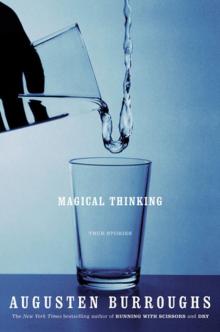 Magical Thinking: True Stories
Magical Thinking: True Stories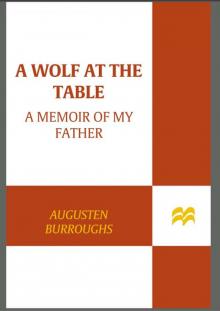 A Wolf at the Table
A Wolf at the Table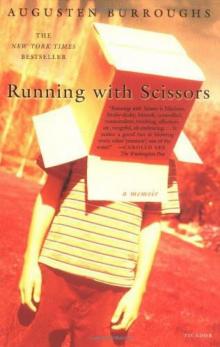 Running With Scissors
Running With Scissors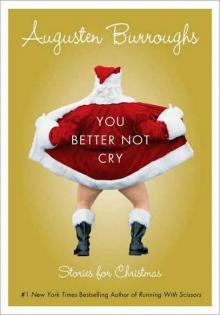 You Better Not Cry: Stories for Christmas
You Better Not Cry: Stories for Christmas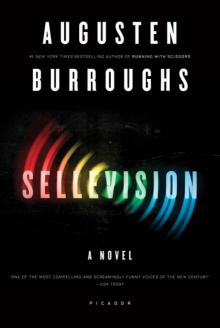 Sellevision
Sellevision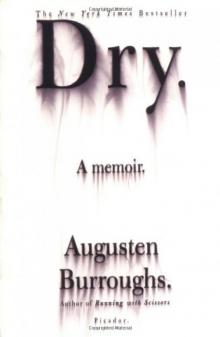 Dry
Dry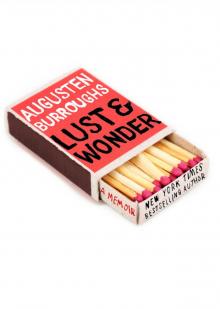 Lust & Wonder
Lust & Wonder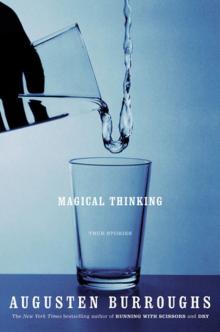 Magical Thinking
Magical Thinking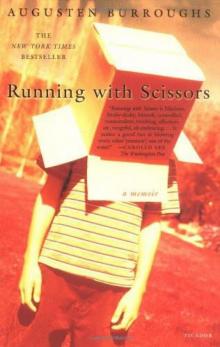 Running With Scissors: A Memoir
Running With Scissors: A Memoir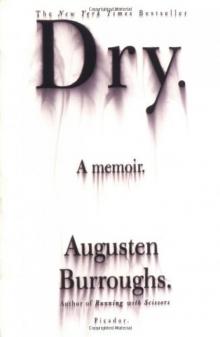 Dry: A Memoir
Dry: A Memoir